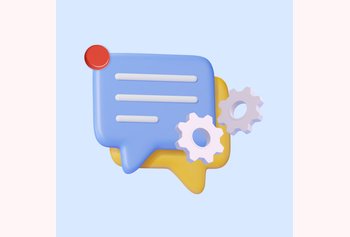10 Best Email Providers for Customer Care Agents in 2025
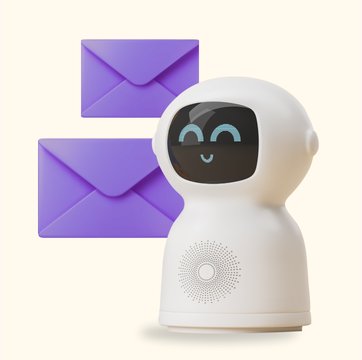
Table of contents
Imagine sending a high-priority product update email to 10,000 customers only to discover half of the emails landed in spam folders. The security patches never reach your enterprise clients. Your team scrambles to rebuild the domain’s reputation while dealing with frustrated customers—all because you chose an email provider based on price alone.
While social platforms and instant messaging tools have their place, nothing matches email’s ability to provide detailed, documented solutions to customer queries. However, this effectiveness hinges entirely on choosing the right email provider.
This guide reviews the top 10 best email providers for customer service agents in 2025.
Top 10 Email Providers for Customer Support Teams in 2025
With so many options available, finding an email provider that fits your team’s needs and enhances your communication with customers is essential. We’ve compiled a list of the top 10 email providers for customer support teams in 2025.
- Gmail
- Outlook
- ProtonMail
- Fastmail
- Zoho Mail
- Tuta
- iCloud Mail
- Yahoo Mail
- Hushmail
- Mailbox.org
Before diving deeper into each tool, here is a quick sneak peek into their pricing and ratings:
| Email provider | Starting price/user/month | G2 score |
| Gmail | $7.20 | 4.6/5 |
| Outlook | $5 | 4.5/5 |
| ProtonMail | $6.99 | 4.4/5 |
| Fastmail | $6 | 4.3/5 |
| Zoho Mail | $1 | 4.4/5 |
| Tuta | $3.23 (approx) | 4.6/5 |
| iCloud Mail | $0.99 | NA |
| Yahoo Mail | $5 | 3.8/5 |
| Hushmail | $10.79 | 3.7/5 |
| Mailbox.org | $1.10 (approx) | 4/5 |
1. Gmail (Best for: Customer support teams using Google Workspace)
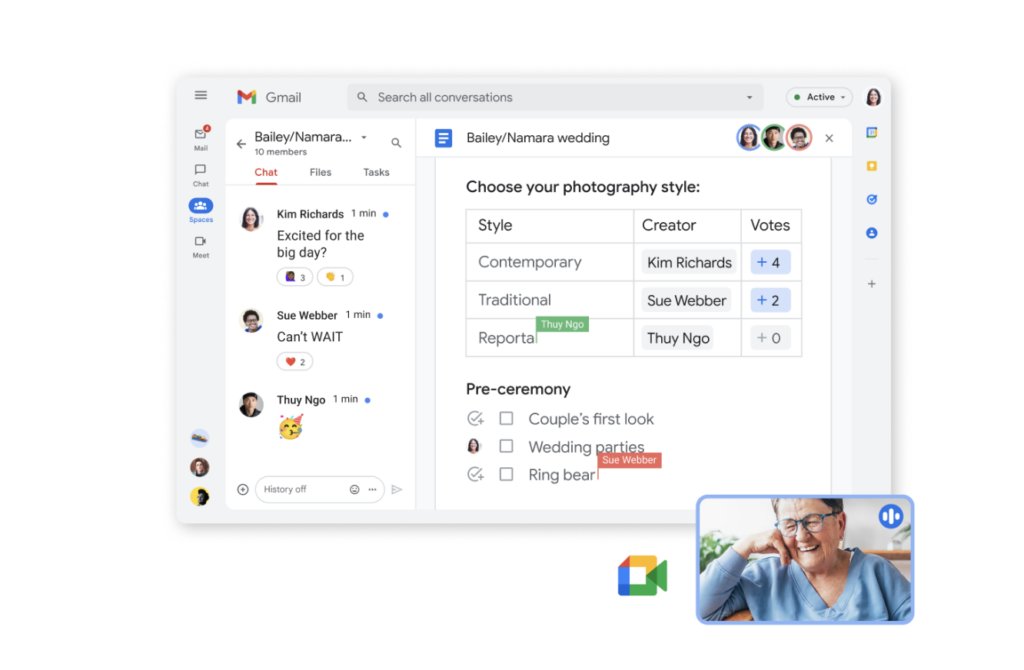
Gmail is a secure email provider with billions of users worldwide. It stands out for its clean, user-friendly interface, which puts everything support teams require in the same place—from labels and filters to quick actions and keyboard shortcuts.
Support teams can use Gemini AI – integrated into Gmail – to draft responses quickly, search through conversation history efficiently, and manage multiple customer inquiries in one interface.
Integrating with Google Meet and Chat allows teams to discuss complex customer cases without leaving their inbox.
Standout features
- Smart categorization automatically sorts customer inquiries
- Built-in AI writing assistance for faster response time
- Advanced search capabilities for finding past conversations
- Smart compose that offers context-aware suggestions
“I like Gmail for Business because it is easy to use, controls spam, and works with tools like Google Workspace. However, it does have some problems, like being too sensitive to spam sometimes and not being able to connect to CRMs fully.” – Mira Nathalea, CMO at SoftwareHow.
2. Outlook (Best for: Support teams handling enterprise-level customer communication)
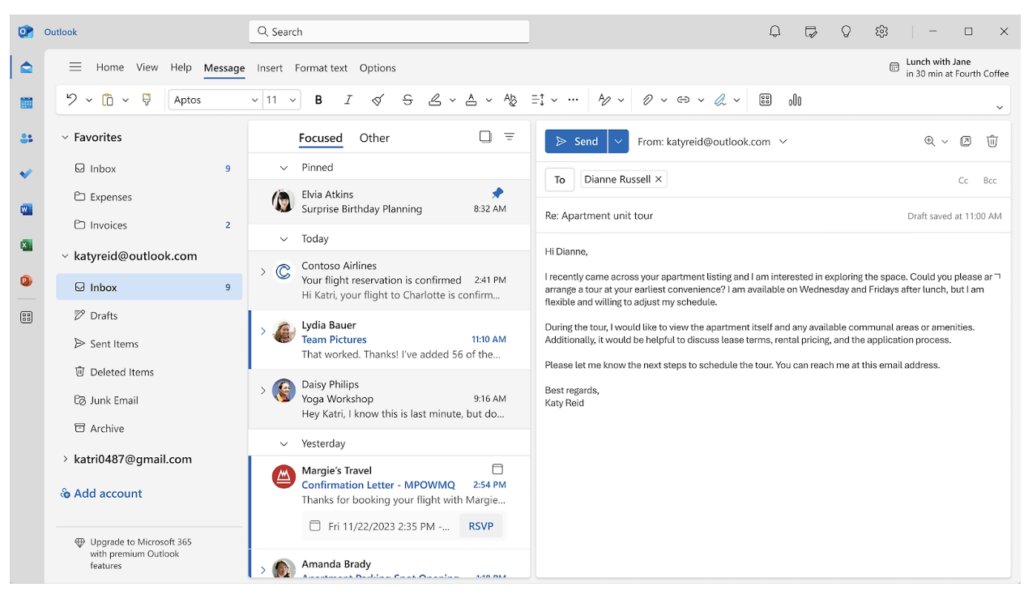
Outlook provides support teams with robust organization tools for managing high-volume customer interactions. Teams can easily track customer conversations, schedule follow-ups, and collaborate on responses using shared mailboxes.
The platform’s enterprise-grade security ensures sensitive customer data stays protected.
Standout features
- Advanced email filtering for prioritizing urgent customer queries
- Shared inbox capabilities for team collaboration
- Calendar integration for managing customer meetings
- Focus inbox to separate high-priority customer messages
“Outlook stands out for B2B customer support due to its integration with Microsoft 365, providing seamless access to Word, Excel, and Teams. Its strong security features and spam filters keep you safe from phishing, which is very helpful in business-to-business settings. Outlook can be slow with bigger attachments, though, and new users who aren’t used to Microsoft’s ecosystem may need some time to get used to it.” – Arvind Rongala, Founder, Edstellar.
3. ProtonMail (Best for: Support teams handling sensitive customer information)
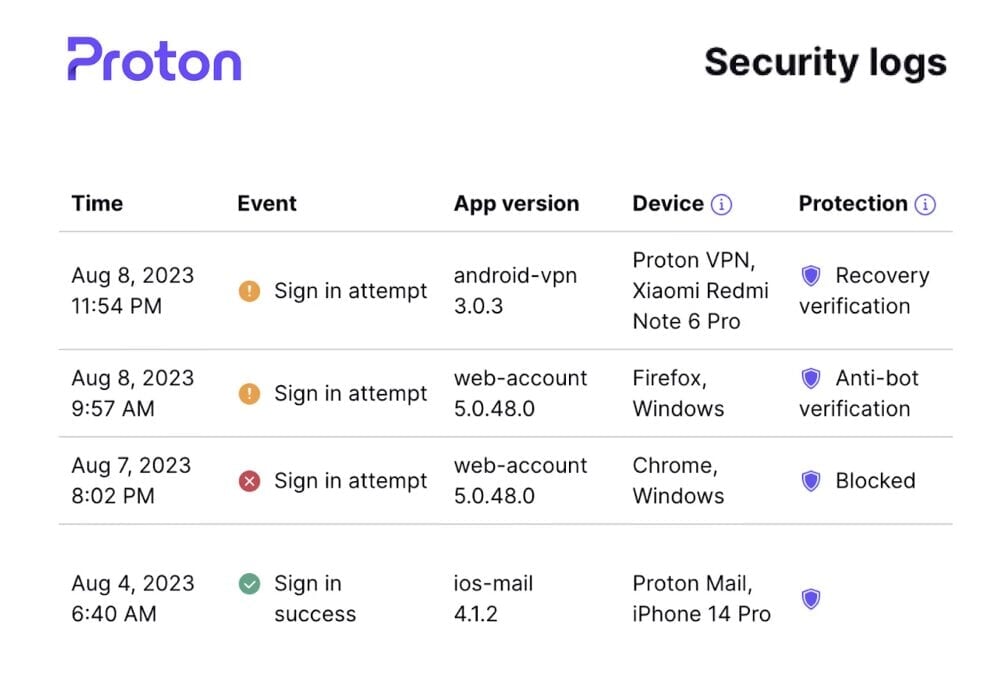
ProtonMail gives support teams something unique—a guarantee that only they can see their customer conversations. Thanks to its end-to-end encryption, not even ProtonMail can access the content of your emails or attachments.
Their Easy Switch feature helps teams transition from other email providers in one click, importing emails, labels, contacts, and calendars while setting up automatic forwarding.
Standout features
- Zero-access encryption for complete customer data privacy
- Self-destructing messages for time-sensitive information
- Encrypted attachments for secure file sharing
- Password-protected emails for external recipients
An added benefit of using ProtonMail is that it supports integration with Gmail. One user states: Easily supports integration of Gmail inbox for simple access in one platform. Used for sending and receiving attachment files securely via emails.
4. Fastmail (Best for: Customer support teams needing customizable domain support)
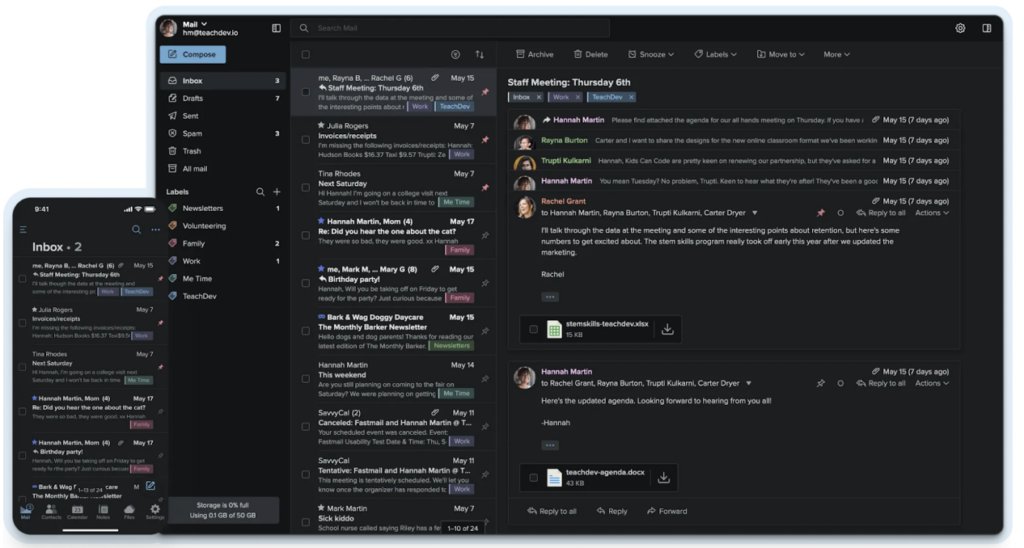
Fastmail is a reliable email provider that helps support teams maintain quick response times. Teams can snooze customer tickets until they need attention, pin critical messages to the top of their inbox, and find any past conversation in seconds with a powerful search.
The Masked Email feature helps support teams keep their real email addresses private while still maintaining quick access to all customer communications. With no ads or data mining, teams can focus entirely on customer needs.
Standout features
- Fast email loading and search capabilities
- Custom domain email setup with simplified configuration
- Masked email features for managing customer contact lists
- Rule-based email sorting for automated workflows
Recommended Read: Is FastMail better than Gmail?
5. Zoho Mail (Best for: Small to mid-sized support teams requiring CRM integration)
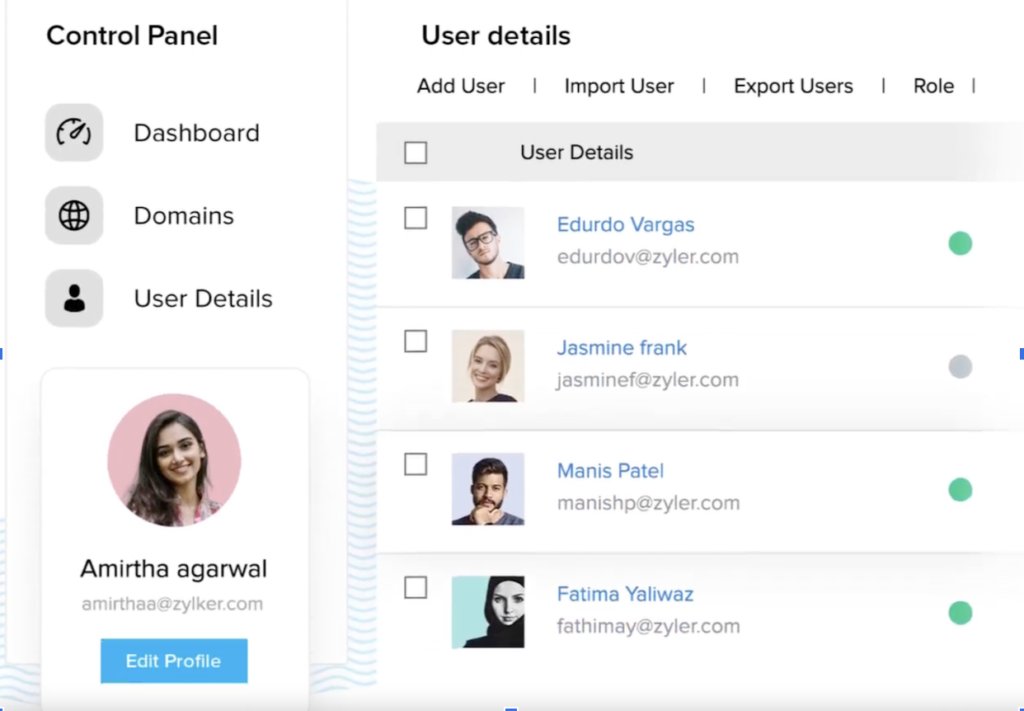
Zoho Mail is a secure, fully encrypted, ad-free email service provider for support teams looking to enhance communication with a professional touch. With its integrated approach to support, Zoho Mail makes customer communication seamless.
Zoho Mail helps support teams maintain a professional image with custom domain email addresses (like [email protected]). Its unique Streams feature turns long email threads into easy-to-follow conversations where teams can comment, tag colleagues, and share files in the inbox.
Standout features
- Direct CRM integration to track customer interactions
- Real-time team collaboration tools
- Advanced admin controls for managing support workflows
- Stream feature for internal team discussions on customer cases
Zoho Mail users commend the platform for its ease of use and ability to centralize tasks. Here’s one review on G2 that reiterates this: The functionality of the admin console within the mailbox ensures I can easily go about doing any task without having to log into some other portal.
6. Tuta (Best for: Support teams requiring quantum-safe security)
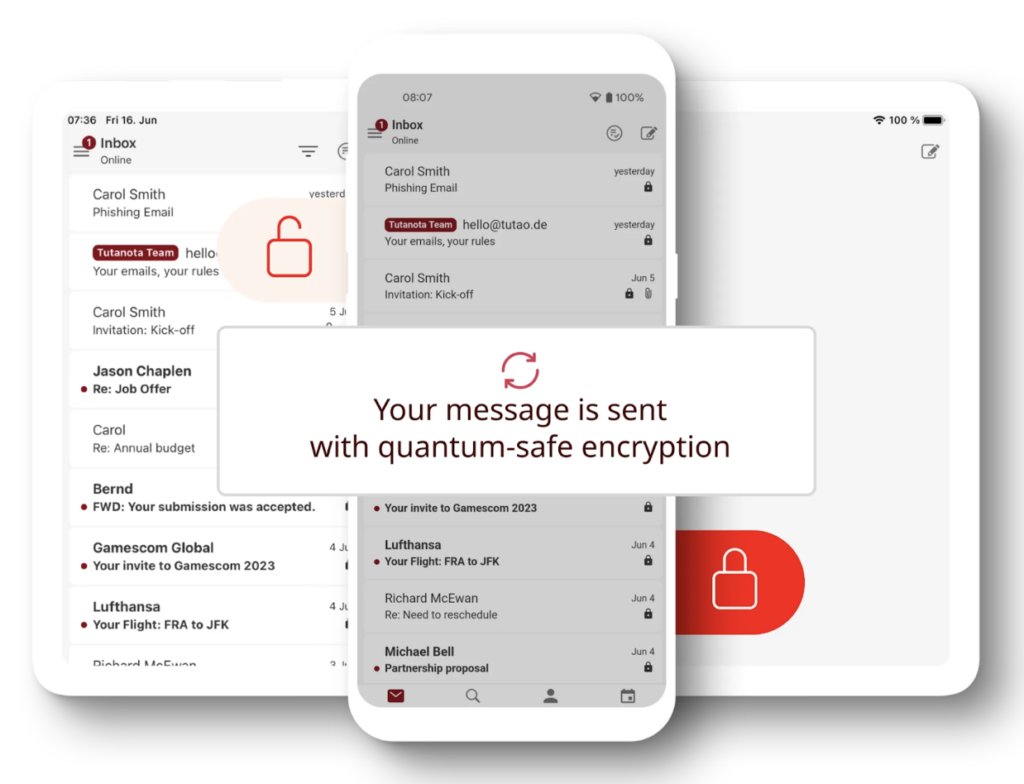
Tuta offers a complete privacy package for support teams – encrypted email, calendar, and contacts all in one place. What makes it unique is its quantum-safe encryption that protects customer communications at the highest level, while running entirely on renewable energy. Support teams can manage their daily workflow with end-to-end encrypted tools that automatically secure every customer interaction, message, and appointment.
Whether teams use custom domains for professional branding or collaborate on sensitive customer cases, Tuta ensures everything stays private by default – and environmentally responsible, too. Their commitment to sustainability extends beyond green energy to using eco-friendly data centers and supporting environmental initiatives.
Standout features
- Zero-footprint email provider running on green energy
- Built-in protection against email tracking
- Secure calendar integration for customer appointment management
One Tuta user on G2 praises the tool for its security features: “Tutanota is an end-to-end encrypted service that I mostly use whenever I want to send sensitive emails. It has a simple interface and its app on my device works flawlessly.”
7. iCloud Mail (Best for: Support teams deeply integrated in the Apple ecosystem)
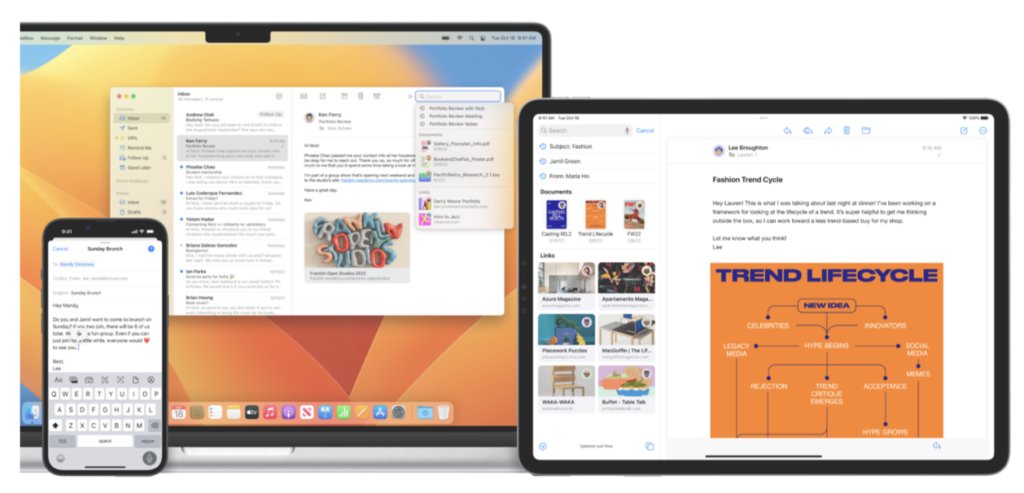
iCloud Mail puts privacy at the center of support team communications. Their Mail Privacy Protection keeps customer service interactions confidential by hiding agents’ IP addresses and blocking tracking attempts – so no one can monitor when or where emails are opened.
The Hide My Email feature (available with iCloud+) generates unique forwarding addresses for teams handling sensitive inquiries, letting agents communicate with customers without exposing their real email addresses.
With two-factor authentication and encryption backing everything up, support teams can focus on helping customers while knowing their communications stay private across all Apple devices.
Standout features
- You can receive and send emails without sharing your email address, as iCloud generates random email addresses to keep your ID protected
- Built-in spam intelligence for reducing unwanted messages
8. Yahoo! Mail (Best for: Support teams requiring extensive storage)
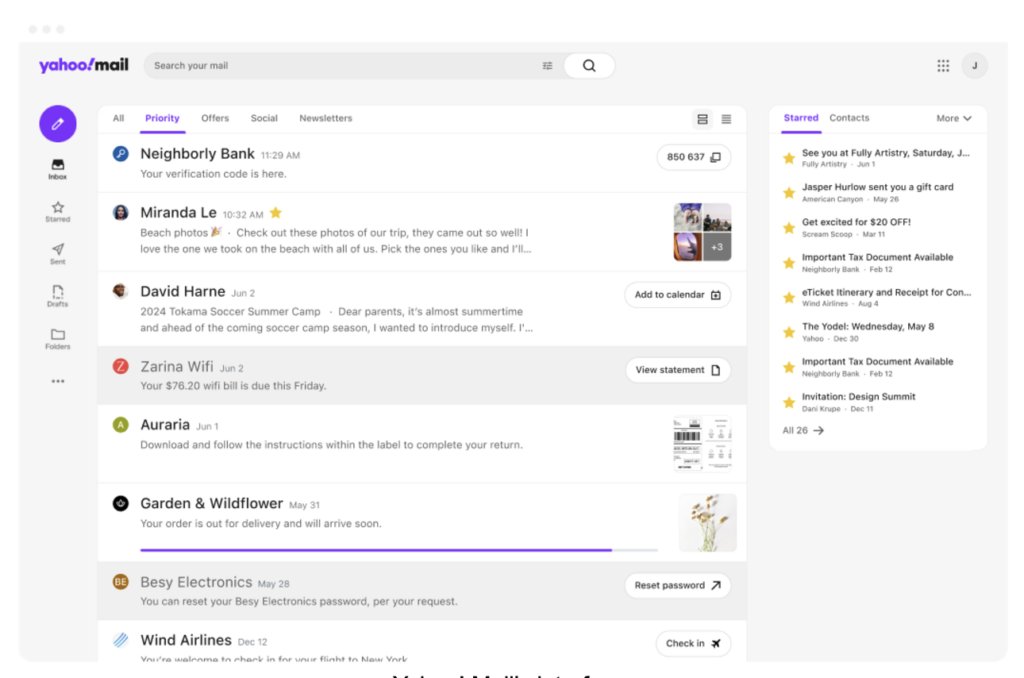
Yahoo! Mail offers support teams substantial storage space and allows them to manage multiple email accounts. The platform helps teams manage high volumes of customer emails with smart features for tracking and organizing communications.
Standout features
- 1TB storage for extensive customer communication archives
- One-tap unsubscribe for managing promotional emails
- Built-in package tracking for shipping-related inquiries
- Built-in spam protection and security filters
Even user reviews point out Yahoo! Mail’s storage capacity as its biggest benefit: It has more storage options, more customizations. It also has powerful spam filters.
9. Hushmail (Best for: Healthcare support teams requiring HIPAA-compliant tools)
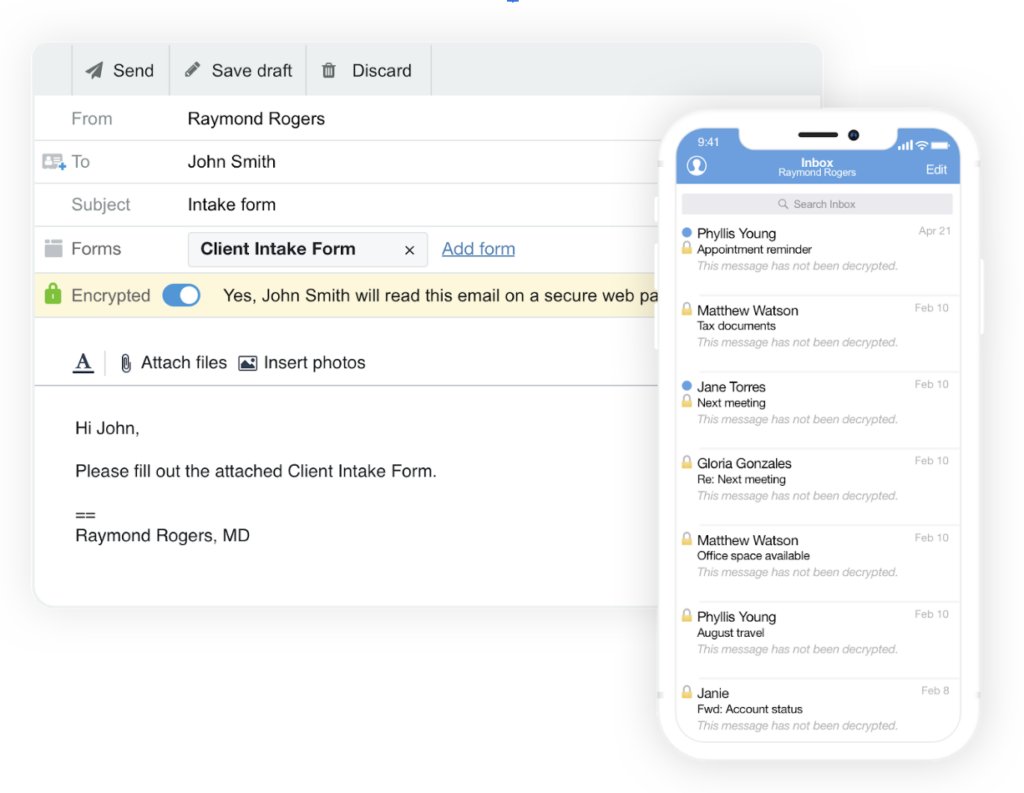
Hushmail helps support teams handle sensitive client communications with complete privacy. Beyond basic encrypted email, it offers a Private Message Center where clients can securely read and respond to messages, create secure online forms, and collect e-signatures – all HIPAA-compliant.
Teams can customize the experience by using their domain names or domains. It is particularly useful for healthcare support because everything works like regular email but with added security features, making it easy for both staff and clients to use. The platform includes a Business Associate Agreement (BAA) and email archiving to help maintain compliance.
Standout features:
- HIPAA-compliant email and form systems
- Electronic signature capability for patient documents
- Secure web forms for patient intake
- Private message center for secure client communication
10. Mailbox.org (Best for: Support teams needing European data protection compliance)
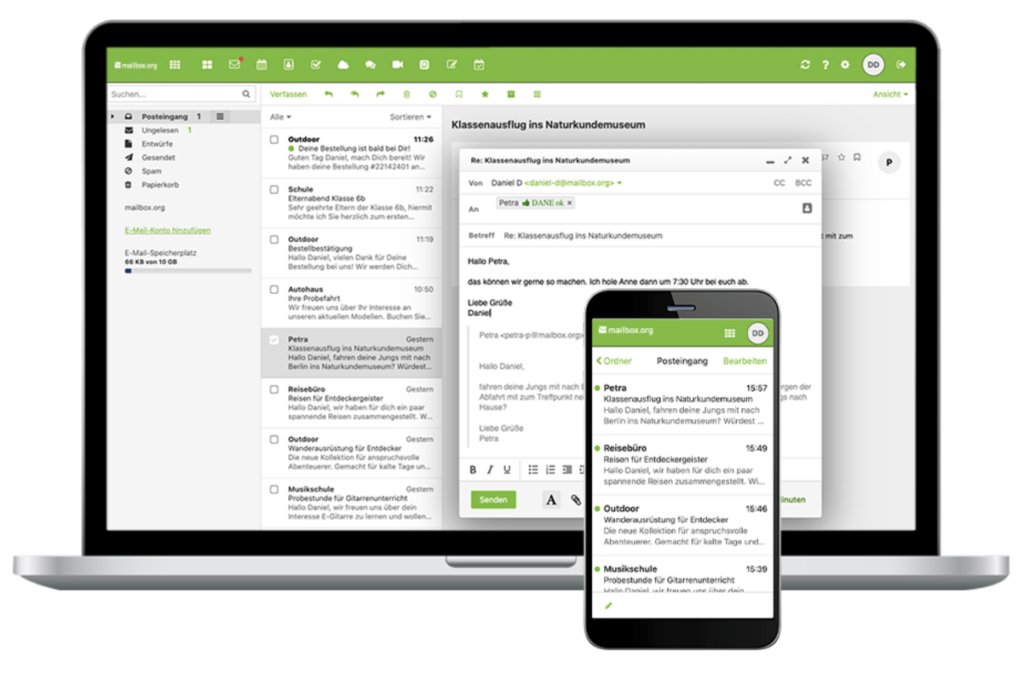
Mailbox.org is a complete communication hub with email, cloud storage, office tools, and video conferencing, all protected by strict German privacy standards. Teams can use their domain names, create multiple aliases for different support channels, and access everything through encrypted connections.
What makes it stand out is its OpenTalk feature for secure video meetings with customers, all hosted in German data centers under GDPR compliance. The service stays ad-free and tracking-free, letting support teams focus on customer communications while knowing their data is protected by some of Europe’s strongest privacy laws.
Standout features
- Zero-knowledge encryption for emails and cloud storage
- Operates on 100% renewable energy infrastructure
- Ad-free platform with no tracking
- European privacy law compliance
- Built-in video conferencing for customer meetings
How to Migrate to a New Email Provider?
Suppose your customer support team with ten agents needs to migrate their [email protected] email address to a new provider while maintaining uninterrupted service.
In that case, you should follow the below-mentioned steps:
- Back up all support emails and contact data
- Document existing templates and workflow configurations
- Create identical email accounts on the new server
- Update the domain’s MX records to point to a new provider
- Import team’s shared templates and autoresponders
- Set up team access and permissions
- Test email routing and team collaboration features
- Run both systems parallel for 48 hours
- Verify successful migration and deactivate the old system
💡Pro tip: Schedule migration during low-volume periods and inform customers about possible slight delays during the 48-hour DNS propagation.
Common pitfalls to avoid when migrating from one email provider to another
Email migration is a complex process that can significantly impact business operations, especially when dealing with customer data. While switching providers might seem straightforward, it requires meticulous planning to maintain data integrity and ensure uninterrupted customer service.
As Jacob Barnes, Co-founder at FlowSavvy, notes, “Migration isn’t much of a consideration because you’ll hopefully only deal with it once before you land on the right long-term solution.”
However, when the time comes, here are critical pitfalls to avoid:
- Not accounting for the 24-48 hour period required for DNS records and MX settings to fully propagate, which can lead to lost emails if the old provider access is terminated too soon
- Failing to back up and transfer secondary data like contacts, calendar entries, email templates, and autoresponders that aren’t part of the primary email archive
- Skipping thorough testing of critical features like email routing, spam filters, and third-party integrations before full migration, leading to service disruptions
- Migrating during peak business hours rather than scheduling the transition during low-traffic periods like weekends causing unnecessary business disruption
- Not providing clear timelines and guidance to team members about the migration process, confusing access changes, and potential service interruptions
Choosing the Right Email Provider for Your Needs
Selecting an email provider involves more than comparing prices and storage limits. You want a solution that meets your business’s unique security, collaboration, and customer support requirements. Even major brands, like Amazon, have faced challenges—such as accidentally sending baby registry emails to thousands of unintended recipients—highlighting the importance of choosing wisely.
Think about what matters most to your team. Do you need strong security features like ProtonMail offers? Or do you want seamless integration with other tools like Gmail?
For teams already using Gmail or Outlook for work communication, Hiver can significantly improve your email provider’s existing capabilities.
The tool allows you to assign, track, and collaborate on emails across teams. This boosts visibility and accountability as everyone knows what they’re working on. With features like automated task delegation and custom SLA reminders, Hiver helps ensure that no email goes unanswered.
Join over 10,000 teams already simplifying their email processes with Hiver. Start for free













